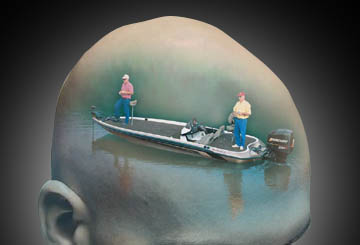Teachers, teammates and partners: What can be learned

In a few more weeks, Father Time will tap your shoulder, and when he does you will jump into action and once again create Ye Olde New Year’s Resolutions! You do this every January, right? As a conscientious competitive angler, you will set aside time to review your tournament performances from 2007 and objectively look at where you did well but also where you stumbled. Good anglers will then consider what they might do to improve for the coming year. The very best anglers will take real, practical steps to both strengthen their current skills and actually fix the problems they had last season.
If you pay attention to discussions on Internet chat boards, at sport shows and in fishing club meetings, you will hear lots of thoughts and opinions about the latest crankbaits, hot new finesse worms and the best little under-the-radar bass lake in your state. What you probably won’t hear, however, is talk about what is arguably the most important aspect of fishing: the people with whom you associate.
Good companies worldwide recognize that the key to business success is hiring, training and retaining talented, loyal employees. Several fishing publications in the last few years have encouraged tournament fishermen to think of their competitive angling careers as a small business. If you haven’t considered this idea, or if you have not read anything on this topic, you probably should. To help jumpstart your thinking, here are some personnel pointers that just might help you fish better in 2008.
There is an axiom in psychology that says if you want to understand a person’s character, look at the character of people he or she associates with regularly. It’s a variation of the saying “Birds of a feather flock together.” So for example, honest people don’t typically have friends who are thieves and liars, and the kids in the chess club didn’t hang with the jocks. You get the picture. Applying this to your competitive fishing career, are you affiliating with people whose skills, temperaments and values make you a better angler? Let’s discuss your angling associates in terms of three key psychological dimensions: feedback, inspiration and support.
Feedback
Success in every sport requires ongoing, accurate feedback. If you pay close attention to your fishing style, you can probably give yourself feedback about what works and what doesn’t. However, your fishing buddies or tournament partner should also be able to notice things about how you are fishing that you can’t see yourself. None of us is perfectly accurate when it comes to self-evaluation. Consider the people you fish with and ask yourself, Do they give honest, accurate feedback?
Last season we drifted close to another boat during a tournament, and I heard one angler tell his partner he seemed tentative setting the hook. Later the two were overheard discussing this topic in the parking lot after the weigh-in, providing a good example of how open communication and honest feedback can help anglers help each other.
You might also think about whether you make it easy or difficult for people to give you suggestions or make critical comments about your fishing style. One tournament angler I know gets so upset with people who criticize him that no one feels comfortable offering ideas or making suggestions. If you are that way, you may be missing out on potentially helpful information.
Inspiration
Inspiration can arrive in several forms. Most obvious are the individuals who inspire us to go above and beyond what we thought we could do. Professional anglers who model relentless determination, long hours of dedicated practice and a do-whatever-it-takes attitude may provide the impetus we need to take our angling careers to the next level.
Personally, I am inspired by those veteran anglers who continually challenge themselves to learn. Guys like Larry Nixon, Rick Clunn and Jay Yelas come quickly to mind. These pros have been at or near the top of their sport for decades, and yet they retain a sincere passion for learning. Whenever I start getting complacent about my own learning, I need only to think of these guys, still pushing themselves to learn and grow.
Who do you find inspirational? It might be helpful to write down the names of inspirational people you know or have known. Perhaps there is a way for you to draw on their inspiration to make 2008 your best year yet.
Support
Yeah, I know what you’re thinking. You don’t really need support. You can deal with the ups and downs of fishing just fine. Well, let me share a little secret with you. Research into the lives of successful athletes consistently reveals the presence of a solid support network, oftentimes an extended support network.
Whether you realize it or not, you will fish better if the people you associate with are primarily encouraging, positive and supportive. This might seem to contradict what you just read about feedback, but it doesn’t really. People can give you feedback or suggestions in a positive, encouraging way, or they can offer the same advice in a critical, demeaning, hostile manner. Which do you think would be more helpful?
So as you approach your year-end review, do what good managers do and evaluate your personnel. Are your people giving you honest, accurate feedback, are they providing growth-oriented inspiration, and do they help create a positive emotional climate in which you can flourish? Or, on further review, do some of your people turn out to be excessively negative, disinterested in learning and/or uninspiring? Depending on what you find, you may need to make some personnel changes this season.

————————————————–
Jay T. McNamara, Ph.D., L.P., also known as Dr. Fish, recently finished his book “The Psychology of Exceptional Fishing.” You can order it by contacting Jay via e-mail at this address: [email protected].
————————————————–
Jay T. McNamara, Ph.D., L.P., is a psychologist, who is also an avid bass and walleye angler. With more than 26 years of professional experience complemented by participation in competitive fishing at local and national levels, he is uniquely qualified to illustrate how performance psychology principles apply to tournament fishing.